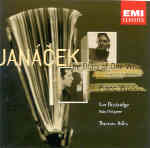The reference standard for Janácek’s mesmerizing The Diary of One Who Disappeared has long been Beno Blachut’s 1956 recording with Josef Pálenícek (on Supraphon, paired with Nicolai Gedda’s gripping 1984 account, with the same pianist). Ian Bostridge’s recent reading, with noted composer Thomas Adès as accompanist, will not displace Blachut’s; in fact, they are not even comparable. While both sing this work with equal conviction, Bostridge gives us a spotlessly-sung lieder recital, whereas Blachut inhabits the “role” of the lovesick, forlorn, and guilt-ridden protagonist, treating the song cycle as kind of opera manqué. To be sure, Bostridge, while he pronounces the words in perfect Czech, simply does not effect the same dramatic characterizations that the native Blachut musters and thus we do not hear the resigned anguish in, for instance, the declamatory consignments to fate (track 17).
In some ways, the gravity of Blachut’s ultra-Slavic rendition stands apart from most other competitors. By contrast, Bostridge, who follows in the British tradition of Peter Pears and Robert Tear, lets us revel in his graceful, pulpy lyric tenor, which boasts an equal facility for those fortissimo high-Cs in the last song as for the limpid pianissimo passages in the sixth song. For a better vocal comparison, you should turn to Peter Straka’s sensitive, “head voice”-rich 1998 reading (also on Supraphon).
This is not to say that Bostridge is emotionally unavailable in this music. In the first song’s halting phrases he captures the speechlessness one experiences during infatuation; similarly, you hear the haunting sensation directly in the next stanza (“Why does she stay here/Why won’t she go away?”) and you can feel the empathetic frustration in the fifth song when he just can’t get the gypsy out of his head. You would have expected more “character development” from Bostridge, as you would assume he might have offered some insight from his recent staged, English-translation version.
Ironically, the real star of this disc is his accompanist Adès. Not only does he appear on every track of the disc (in the gem-like Moravian Folksongs and other piano miniatures), he also adds atmosphere and dimension to the words, illuminating the text at every turn. Check out for instance the luminous twinkling in the third song (“The glow-worms are dancing”) and the subtle dawn episode in the following section. His clangorous closing peroration in the final section fills in the intensity that is largely missing from Bostridge (despite those amazing high-Cs). In the final analysis, this release is highly worthwhile, in excellent sound and in an interpretation that emphasizes reverie over passion.
































